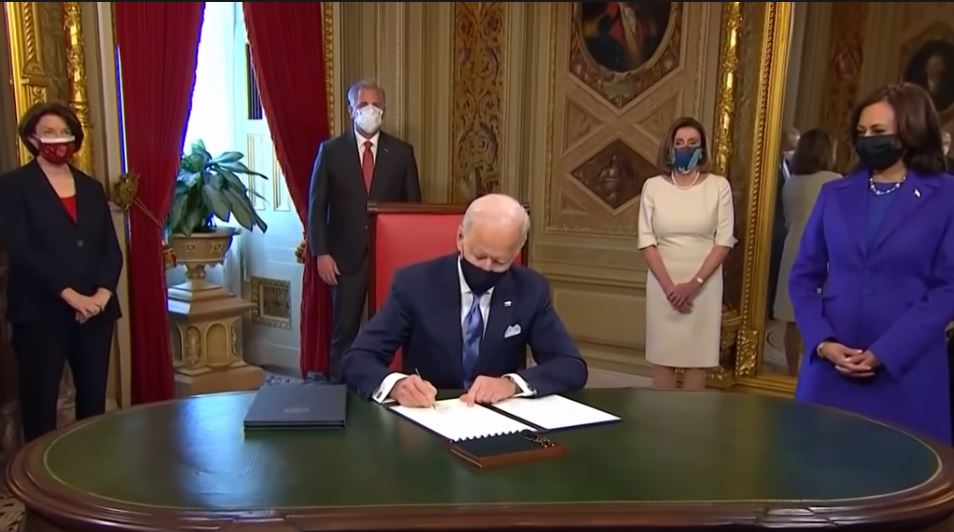Presidents have routinely abused the Antiquities Act of 1906, a seminal law intended to protect federal lands for scientific, cultural, or historical purposes. Today, they hide behind this law as they strip the public of user access to enormous expanses of public lands. President Biden is offender in chief.
Since entering office in January 2021, President Biden has authorized the permanent protection of 24 million federal land acres—including five new national monuments—to boost his “America the Beautiful” initiative that calls for conserving 30% of lands and 30% of waters by 2030. The plan, however, fails to define conservation, which may lead to confusion. Conservation doesn’t mean resources are off-limits; it means wise use of resources to honor and sustain them.
Public lands should be open and accessible to all users. President Biden’s agenda, however, is intended to convert multiple-use federal lands into national parks. That’s why Congress should reform the Antiquities Act.
Presidents have authority under Section II of the Antiquities Act to create, expand, and even shrink national monuments. This section, however, also stipulates presidential power to declare sites must be “confined to the smallest area compatible with proper care and management of the objects to be protected.”
Congress must clarify what “smallest area compatible” is and if actual antiquities are being protected to prevent overt land grabs from occurring. Is it half a million acres, like Biden’s second monument, Avi Kwa Ame, in Nevada? Or nearly a million acres to be closed off to mining and grazing near Grand Canyon National Park in Arizona? Should the designations not exceed 100,000 acres? Americans agree that “smallest area compatible” shouldn’t encompass large national park-like designations that potentially put multiple-use activities to pasture.
Congress has successfully curbed Antiquities Act abuses before when it limited presidential authority to designate monuments in Alaska and Wyoming. There is precedence for the House and Senate to find consensus and reform the law again.
If it fails to act here, the Supreme Court has indicated it would weigh in on the matter. In March 2021, Supreme Court Chief Justice John Roberts warned challenges to the Antiquities Act might be warranted because the law “has been transformed into a power without any discernible limit” since presidents have ignored Section II limiting monuments to “the smallest area compatible with the care and management of the objects to be protected.”
Congress has the authority to conduct oversight on monument designations to ensure the process is democratic and invites consultation by all affected stakeholders. All five national monuments created since 2021 were sites that had been brought to the Biden administration’s attention by influential environmental groups.
Shawn Regan of the Property and Environment Research Center (PERC) warned the absence of stakeholder input could “corrode the democratic process and undermine compromise” since environmental groups refuse to come to the bargaining table and, instead, directly lobby the White House.
Congress has considered positive reforms before. One proposal made in 2017, had it passed, would have required presidents to attain Congressional approval, approval of affected state legislatures, and proof of certification of compliance with the National Environmental Policy Act (NEPA) before proceeding with the creation of new monuments. Last fall, Senate Republicans introduced a bill to grant Congress more oversight over the Antiquities Act. The appetite for reform is there.
Unilateral monument declarations often have unintended consequences resulting in loss of public lands access for hunters and anglers—the largest financial contributors to conservation funding. There are documented cases of proposed monuments restricting recreational access and state wildlife agencies, including the Arizona Game and Fish Department, from managing species and protecting their habitats. Restricting these activities on public lands would not only diminish funding—like the historic $1.6 billion haul in 2023—but lead to ecological imbalance that results in unnecessary human-wildlife conflicts. The Biden administration is doing a shoddy job engaging sportsmen and women by banning lead usage for public land fishing and hunting opportunities and closing 60 million public land acres to caribou hunting in Alaska, for example.
Public lands must remain open to all users—not just the Biden administration’s preferred environmental groups and their supporters. That’s why the Congressional Western Caucus recently filed an amicus brief urging the Supreme Court to hear challenges to the law to bring it into the 21st century. If the Supreme Court won’t do this, Congress should act.
Twisting the original intent of a law to serve an unrelated political goal is not new. In fact, it’s a trick as old as antiquity. But Congress shouldn’t tolerate this from the Biden White House, on the Antiquities Act, or anything else. Access to our public lands and the democratic process are at stake.
This article originally appeared at Real Clear Energy
